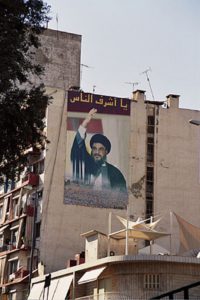 (AINA) — During my stay in Lebanon in April I visited some Christian families living in South Lebanon in village called Ein Ebel. The reason for my visit there was to meet people connected with the South Lebanon Army (SLA) to conduct interviews for my documentary entitled „This is my Holy Land”, a story about SLA families.
(AINA) — During my stay in Lebanon in April I visited some Christian families living in South Lebanon in village called Ein Ebel. The reason for my visit there was to meet people connected with the South Lebanon Army (SLA) to conduct interviews for my documentary entitled „This is my Holy Land”, a story about SLA families.
Ein Ebel, where predominantly Christians live, is a small village picturesquely situated in the border zone with Israel, and unfortunately, in the Muslim neighborhood where Muslims cooperate with Hezbollah. The location of the village caused serious problems for Christian families during the recent war in August 2006, as the majority of them are the SLA soldiers who used to cooperate with Israel before 2000. To take revenge on them Hezbollah used their homes to store weapons and attack the Israeli army.
As those families were given no support from the Lebanese government, they were not able to oppose Hezbollah terrorists. As a result their workplaces and homes were bombed by the Israeli army. They stress that they did not regret leaving their homes and shops because they believed that the Israeli army would defeat Hezbollah and they would be able to return to Israel or start a new life in a completely different Lebanon.
Unfortunately, the situation in Lebanon has become even worse. Hezbollah has grown in power and is extremely popular in South Lebanon. UNIFIL forces give work to Hezbollah members only, and the Lebanese government has limited the rights of all those who were connected with SLA.
While talking to young people from Christian families connected with SLA I heard bitterness and resentment in their voices about the present situation. They do not think there are any opportunities for them in the future. Although they are well educated, they cannot hope for work in the public sector. They cannot leave for abroad because they do not have passports. UNIFIL forces do not want to engage them because they are afraid of conflict with Hezbollah. They often asked me why international aid organizations do not care for them and the funds are given to others.
By Anna Walczyk

